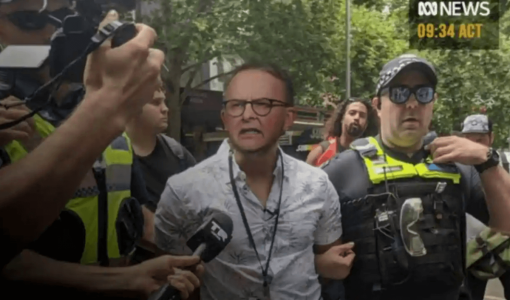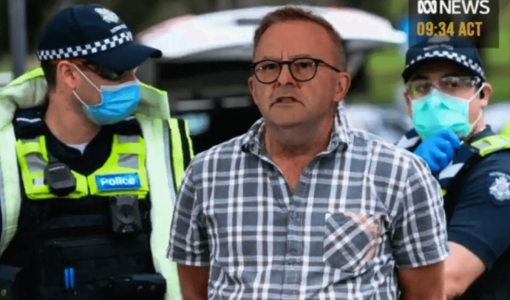New 'Celebrity Scams' doing the rounds: Facebook forced to remove ads featuring fake images of PM Albanese getting 'arrested'
- Replies 7
Facebook can be a welcome escape during these tough times with all the negative news going on, but unfortunately, it can also be a breeding ground for scammers preying on unsuspecting users – and sometimes, even celebrities and public figures.
Anthony Albanese found himself at the centre of attention for all the wrong reasons recently when scam ads featuring fake images of the Prime Minister began appearing all over social media.
The unauthorised content was published via a French music page with 14,000 followers that posted around 51 ads, some of which had between 1,000 and 15,000 views each, according to a recent investigation by Meta's ad library.
The ads, which linked to fake news sites, featured a poorly photoshopped image of the Prime Minister either at a press conference or being arrested with captions saying, 'Didn't know the camera was still recording' and 'Is this the end of his career?'.

The ads are linked to bogus news sites trying to entice people to sign up for an 'investment opportunity'. These ads are, unfortunately, not isolated incidents.
Similar ads featuring former The Project host Carrie Bickmore have recently been spruiked on Facebook, and previous ads featuring Dick Smith, David Koch, Mike Baird, and Andrew Forrest have also been making the rounds on social media since 2020.
The Guardian Australia investigated these sites and found they were registered to addresses in Russia and Ukraine.
Consequently, Facebook was made aware of the ads, and a spokesperson from Meta later confirmed that the page promoting the advertisements had been taken down.
'We've removed the ads for violating our policies. Scams and scam ads have no place on Meta's platforms. They violate Meta's policies and harm our business by negatively affecting people's experiences,' said the representative.

Meta is currently facing two lawsuits over scam ads. The Australian Competition and Consumer Commission (ACCC) is investigating one case which alleges the company 'aided and abetted' celebrity scam ads, claiming that one person lost more than $650,000, while a 77-year-old grandmother lost $80,000 in the investment.
In addition, a criminal court case has been brought against Meta by billionaire Andrew Forrest in Western Australia, alleging the social media company was criminally reckless in allowing the scam ads on its site.
In October, Meta conceded the court had jurisdiction.
The incident has served to reiterate the importance of the public being aware of these scam ads and social networking sites doing their part to be vigilant and actively remove any suspicious content.


As these scams are now arising more and more frequently, we thought we'd take a moment to share some tips and advice for members to stay safe online and never become victims of these malicious practices.
Facebook may be taking steps to remove these ads, but it's important to remain vigilant. If you see any scam ads trying to use celebrity images, or if you've been a victim of a scam online, please get in touch with Report Cyber and your bank immediately.
Members, please share this article with your friends and family and together, we can help keep our community safe. Visit the Scam Watch forum on the SDC website regularly to stay informed as well.
Do you have any other tips for staying safe online? Tell us in the comments below!
Anthony Albanese found himself at the centre of attention for all the wrong reasons recently when scam ads featuring fake images of the Prime Minister began appearing all over social media.
The unauthorised content was published via a French music page with 14,000 followers that posted around 51 ads, some of which had between 1,000 and 15,000 views each, according to a recent investigation by Meta's ad library.
The ads, which linked to fake news sites, featured a poorly photoshopped image of the Prime Minister either at a press conference or being arrested with captions saying, 'Didn't know the camera was still recording' and 'Is this the end of his career?'.

The ads falsely claimed that Prime Minister Albanese had been arrested, using manipulated photos from a completely made-up ABC news story. Credit: Facebook.
The ads are linked to bogus news sites trying to entice people to sign up for an 'investment opportunity'. These ads are, unfortunately, not isolated incidents.
Similar ads featuring former The Project host Carrie Bickmore have recently been spruiked on Facebook, and previous ads featuring Dick Smith, David Koch, Mike Baird, and Andrew Forrest have also been making the rounds on social media since 2020.
The Guardian Australia investigated these sites and found they were registered to addresses in Russia and Ukraine.
Consequently, Facebook was made aware of the ads, and a spokesperson from Meta later confirmed that the page promoting the advertisements had been taken down.
'We've removed the ads for violating our policies. Scams and scam ads have no place on Meta's platforms. They violate Meta's policies and harm our business by negatively affecting people's experiences,' said the representative.

A lot of the adverts were for fake news sites that promised a great 'investment opportunity' if you signed up. Credit: Facebook.
Meta is currently facing two lawsuits over scam ads. The Australian Competition and Consumer Commission (ACCC) is investigating one case which alleges the company 'aided and abetted' celebrity scam ads, claiming that one person lost more than $650,000, while a 77-year-old grandmother lost $80,000 in the investment.
In addition, a criminal court case has been brought against Meta by billionaire Andrew Forrest in Western Australia, alleging the social media company was criminally reckless in allowing the scam ads on its site.
In October, Meta conceded the court had jurisdiction.
The incident has served to reiterate the importance of the public being aware of these scam ads and social networking sites doing their part to be vigilant and actively remove any suspicious content.
Key Takeaways
- Facebook had to take action against anonymous pages that used manipulated photos of Prime Minister Albanese to trick people into visiting fake websites.
- Anonymous Facebook pages have been promoting scam advertisements since the beginning of this year, with each post receiving tens of thousands of views.
The ads linked to fake news sites that tried to get people to sign up for an 'investment opportunity'.

If you see anything that looks out of the ordinary, be sure to report it to the relevant authorities immediately. Credit: Pexels/Andrea Piacquadio.
As these scams are now arising more and more frequently, we thought we'd take a moment to share some tips and advice for members to stay safe online and never become victims of these malicious practices.
- Always be mindful when considering payments and investments online, do your research and only support services you know and trust.
- Avoid clicking on unsolicited emails and online ads, as they could be an attempt to obtain your personal information or infect your computer with malware.
- Be sceptical of ads or emails from people representing themselves as, or implying they are, government officials or government spheres.
- Make sure you know who you are dealing with – search the business name, the product name and the web address online to find reviews and more information, and consider searching for similar products to compare their features.
- Check reviews on websites, social media and forums that can tell you more about the company and their practices. Don't rely on a single review, as they may not be genuine.
- Don't be afraid to contact and ask how the business protects your information, like how they keep it safe from cyberattacks and how they store it.
- If you have doubts, contact a consumer protection agency like the ACCC or the Office of Fair Trading and get a second opinion. And remember, if something sounds too good to be true, it usually is.
Facebook may be taking steps to remove these ads, but it's important to remain vigilant. If you see any scam ads trying to use celebrity images, or if you've been a victim of a scam online, please get in touch with Report Cyber and your bank immediately.
Members, please share this article with your friends and family and together, we can help keep our community safe. Visit the Scam Watch forum on the SDC website regularly to stay informed as well.
Do you have any other tips for staying safe online? Tell us in the comments below!







